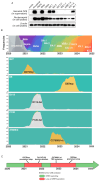The Recurring Loss of ORF8 Secretion in Dominant SARS-CoV-2 Variants
- PMID: 40565240
- PMCID: PMC12193219
- DOI: 10.3390/ijms26125778
The Recurring Loss of ORF8 Secretion in Dominant SARS-CoV-2 Variants
Abstract
The SARS-CoV-2 ORF8 protein is a unique accessory viral protein among human coronaviruses, characterized by recurrent deletions and mutations with functional consequences. In this short report, we demonstrate that several dominant SARS-CoV-2 strains, despite encoding ORF8, fail to secrete the protein, revealing a recurring pattern of ORF8 functional impairment that cannot be detected by sequence analysis alone. In agreement with other studies, several high-frequency mutations were identified using the Nextstrain/augur pipeline, including G8Stop, Q27Stop, D119-/F120- double deletions, and nucleotide substitution C27889U, which occurred in XBB.1.5, Alpha, Delta, and BA.5.2 variants, respectively. Notably, the D119-/F120- deletions and C27889U substitution do not introduce premature stop codons, yet ORF8 secretion was lost in Delta and BA.5.2 virus-infected cultures. This indicates that the extracellular ORF8 function is impaired in these variants, resulting in ORF8 deficiency. Our findings highlight that the impairment of ORF8 secretion arises not only from premature stop codons but also from other mutations. Therefore, the functional validation of ORF8 secretion and activity is essential following sequence analysis to accurately assess ORF8's role in SARS-CoV-2 infection.
Keywords: COVID-19; ORF8; SARS-CoV-2; virus evolution.
Conflict of interest statement
The authors declare no conflicts of interest.
Figures

References
-
- Chan J.F., Kok K.H., Zhu Z., Chu H., To K.K., Yuan S., Yuen K.Y. Genomic characterization of the 2019 novel human-pathogenic coronavirus isolated from a patient with atypical pneumonia after visiting Wuhan. Emerg. Microbes Infect. 2020;9:221–236. doi: 10.1080/22221751.2020.1719902. - DOI - PMC - PubMed
MeSH terms
Substances
Supplementary concepts
Grants and funding
LinkOut - more resources
Full Text Sources
Medical
Miscellaneous

